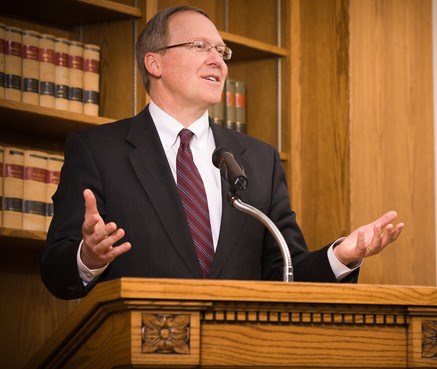





Professor Robert Smith, Managing Director of the International Center for Law and Religion Studies, delivered the concluding lecture in the second Religious Freedom Discussion Series. The Lecture, "A Contest of Greatest Importance: The Battle over the Meaning of Religious Freedom," was delivered on Wednesday, 5 December 2012, at the J. Reuben Clark Law School in Provo, Utah.
The video recording (mp4) of the event, as well as PowerPoint presentation used in the lecture, and the accompanying text, may be downloaded or accessed by clicking the links: Video Recording PowerPoint Text
In an address delivered at BYU-Idaho in October 2009, Elder Dallin H. Oaks of the Quorum of the Twelve Apostles of The Church of Jesus Christ of Latter-day Saints stated: "There is a battle over the meaning of that freedom. The contest is of eternal importance, and it is your generation that must understand the issues and make the efforts to prevail." In his lecture, Professor Smith explained that to prevail in this battle we must first understand what is at stake.
Unfortunately, suggested Professor Smith, today there is great pressure to narrow the concept of religious freedom so that it includes little more than religious worship. Equality and discrimination norms increasingly label religious protections as contrary to public policy. Some favor an outright rejection of the concept of religious freedom claiming that rights of speech, assembly and the press, which apply equally to all organizations, are adequate precisely because any additional protections in favor of religious persons and religious organizations are discriminatory.
In this battle over the meaning of religious freedom, historical arguments are being amassed suggesting that the United States Founding Fathers desired a "Godless Constitution." Making this case, a scholar recently titled his book "The Myth of American Religious Freedom" because laws have historically favored moral conduct when by design the government should be amoral, giving no preference to conduct founded in religious tradition.
The battle over the meaning of religious freedom is thus shifting subtly as religious protections are labeled discrimination and preferential treatment of religion is decried as unequal. Unless we fully understand the meaning of religious freedom, we are in danger of losing this most cherished "First Freedom" of our Bill of Rights as it is inexorably defined away, leaving little left to be protected.
This Discussion Series Lecture by Professor Smith sought to clarify the definition of religious freedom so that its full meaning may be preserved.
Professor Smith received a bachelor’s degree in accounting from Brigham Young University and is a magna cum laude graduate of the University of Notre Dame, where he earned a Masters of Business Administration. He is also a magna cum laude graduate of the J. Reuben Clark Law School, where he was named to the Order of the Coif and served as Editor-in-Chief of the BYU Law Review.
Before joining the Center in 2006, Professor Smith served as Executive Vice-President and General Counsel to CaseData Corporation. Previously, he was a shareholder and chairman of the Corporate and Tax department at the law firm of Kirton & McConkie in Salt Lake City. He also practiced with large law firms in Washington, D.C. and Chicago, Illinois. He spent his early career working as a CPA for Deloitte & Touche in California and Washington, D.C. Professor Smith is a co-author, along with W. Cole Durham, Jr. of the treatise Religious Organizations and the Law, published by Thomson West. This four-volume, four-thousand-page work for lawyers representing religious organizations in the United States is updated annually.
